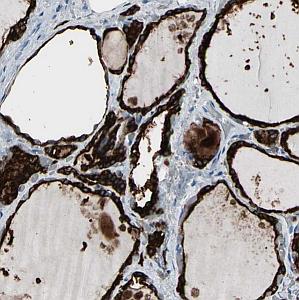The American Thyroid Association isn't always in the front row of "friends" of thyroid sufferers, but sometimes it does publish things of interest. Among these is the summary below which suggests that you can indeed have Hashimoto's without elevated TPO antibodies.
Please note the emphasis by underlining - which I have added.
[B]HYPOTHYROIDISM[/B][I]
Patients with Hashimoto’s thyroiditis and negative thyroid antibodies have a milder form of the disease
[B]BACKGROUND[/B]
Hashimoto’s thyroiditis, also known as chronic autoimmune hypothyroidism, is the most common cause of hypothyroidism in the United States. It is caused by antibodies that attack the thyroid and destroy it. Most patients with Hashimoto’s thyroiditis have measurable antibodies in the blood, with ~90% of patients having positive TPO antibodies and ~50% of patients having positive thyroglobulin antibodies. About 5 % of patients with a diagnosis of Hashimoto’s thyroiditis based on clinical grounds or by ultrasound appearance have no measurable thyroid antibodies. This study was performed to note any differences between patients with Hashimoto’s thyroiditis with positive antibodies and those with Hashimoto’s thyroiditis but without any antibodies present.
.
.
.
.
.
.
[B]WHAT ARE THE IMPLICATIONS OF THIS STUDY?[/B]
Patients with Hashimoto’s thyroiditis and positive thyroid antibodies were more likely present with overt hypothyroidism and a larger thyroid. Patients with antibody-negative Hashimoto’s thyroiditis had a milder form of hypothyroidism at the time of diagnosis. This could represent an earlier stage of the disease or simply a less aggressive form of Hashimoto’s thyroiditis. This study suggests that treating patients with subclinical hypothyroidism and positive thyroid antibodies is important to prevent the development of overt hypothyroidism.[/I]
thyroid.org/patient-thyroid...
Follow link to read more.
Rod
Image is Immunohistochemistry-Paraffin: Thyroid Peroxidase Antibody [NBP1-80670] - Immunohistochemical staining of human thyroid gland shows strong cytoplasmic positivity in glandular cells.
